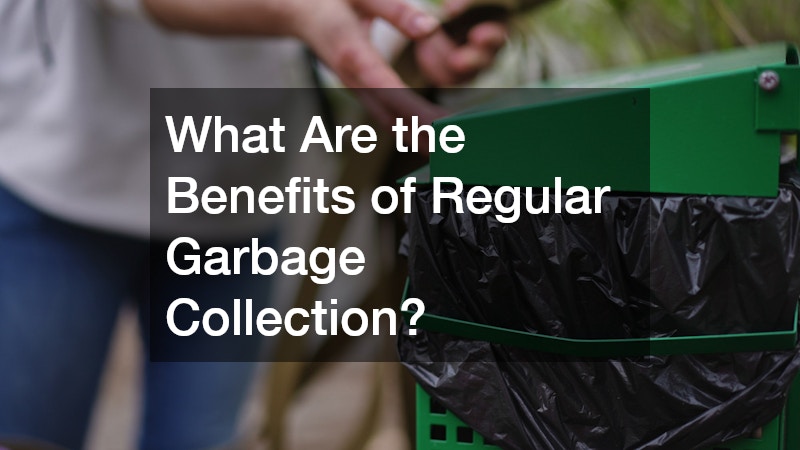
Garbage collection might not be the most glamorous topic, but its importance cannot be overstated. Regular garbage collection plays a vital role in maintaining hygiene and ecology in our communities. It ensures that waste does not accumulate beyond controllable levels, preventing a myriad of problems related to health and the environment.
Video Source
With urbanization on the rise, the need for proper waste management systems has never been more critical. This article delves deep into the benefits of regular garbage collection, showcasing how this seemingly mundane task is essential for a functioning society.
One of the paramount benefits of regular garbage collection is the enhancement of community health. When garbage accumulates in a community, it becomes a breeding ground for diseases. Pests such as rodents and insects are often attracted to garbage heaps, and they can carry and transmit diseases to humans. By ensuring that waste is collected frequently, communities can significantly reduce the risk of health issues arising from unsanitary conditions. Furthermore, prompt waste collection promotes air quality, reducing the risk of respiratory problems associated with decaying waste.
Proper waste management practices, including regular garbage collection, help in controlling the spread of infectious diseases. In many urban areas, poor waste management has been linked to outbreaks of illnesses such as diarrhea, cholera, and dengue fever. Health authorities worldwide stress the importance of regular garbage collection as a preventive measure against such outbreaks. Clean communities are not only healthier but also happier, as they provide residents with peace of mind regarding their physical well-being. Ensuring consistent waste collection routines is a crucial component of public health policy.
Moreover, garbage collection services are vital in mitigating the indirect health impacts resulting from unmanaged waste. As organic waste decomposes, it releases methane—a potent greenhouse gas—into the atmosphere. Methane not only contributes to climate change but also poses health risks when inhaled in significant quantities. Through regular garbage collection and the subsequent proper disposal or treatment of waste, these environmental health risks are reduced. Community health initiatives often link their success to effective waste management strategies, highlighting the interconnectedness of health and sanitation.
Regular garbage collection is equally crucial for environmental protection. When waste is collected consistently, it reduces the risk of pollution on land and in water bodies. Improperly disposed waste can leach harmful chemicals into the soil and waterways, damaging ecosystems and wildlife. By preventing the accumulation of waste, regular collection services contribute to protecting natural habitats and biodiversity. Moreover, they enable recyclables to be processed correctly, thereby reducing the consumption of virgin resources.
Litter and waste that are not collected regularly can also have devastating aesthetic and functional impacts on the environment. Public spaces and natural landscapes marred by waste are not only unsightly but also unsafe. Environments degraded by waste accumulation often suffer diminished tourism, affecting local economies dependent on natural beauty and recreational activities. Regular garbage collection helps maintain the ecological integrity of these areas, preserving them for future generations. It allows cities and communities to flourish without compromising their environmental capital.
In addition to preserving the natural environment, regular garbage collection supports sustainable waste management practices. By systematically collecting and sorting waste, recyclables can be adequately processed, compostables turned into valuable compost, and non-recyclable fractions disposed of in an environmentally safe manner. These efforts aid in reducing the carbon footprint associated with waste. Sustainability efforts often hinge on the effective implementation of regular and comprehensive waste collection efforts, showcasing how crucial they are to broader climate action goals.
Beyond health and environmental considerations, regular garbage collection significantly enhances the quality of life for community residents. Clean and well-managed public spaces contribute to overall community well-being and pride. Residents take greater interest and responsibility in maintaining their environment when they see that their waste is regularly and efficiently managed. Additionally, aesthetically pleasing communities tend to foster better social interactions among residents, encouraging community cohesion and participation.
Regular garbage collection is an indispensable service that underpins the health, environmental stability, and overall quality of life in any community. Beyond the immediate task of waste removal, it provides a foundation for healthier communities, preserves environmental integrity, and fosters a higher standard of living. Policymakers and community leaders must prioritize and invest in efficient waste management systems to ensure these benefits are realized and sustained. As urban populations continue to grow, the demand for effective garbage collection services will only increase, warranting ongoing attention and innovation. It is through these collective efforts that we can maintain hygienic, vibrant, and resilient communities for generations to come.
.